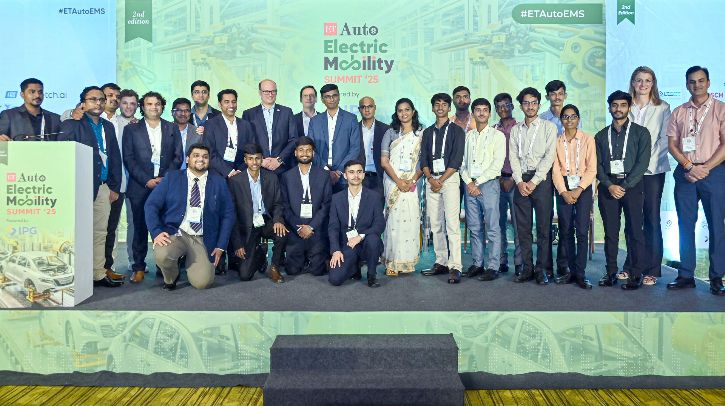The Virtual EV Challenge, a student competition focused on electric mobility in which EVs race across virtual Indian roads, has concluded in Bangalore. Organized by IPG Automotive and Bosch, the challenge drew more than 70 teams from across India, with five teams competing in the grand finale at the ETAuto Electric Mobility Summit 2025 on September 16 where they were tasked with traveling a long distance on a busy Indian road as quickly and efficiently as possible.
The competition was aimed at students and offered a hands-on platform to research innovative technologies for electric vehicles using digital twins and to test them under realistic conditions.
Bosch, the technology partner driving the design and implementation of the Virtual EV Challenge, provided defined evaluation criteria based on which teams were shortlisted and assigned simulation environments replicating real-world Indian road conditions.
The team’s solutions were then assessed for their impact on the overall EV driving experience. The competition focused on EV-specific challenges such as having to plan charging times, book charging stations and make decisions under dynamic conditions using Fetch.ai’s agent framework to gain a competitive advantage.
Powered by IPG Automotive’s simulation solution CarMaker, the challenge offered students a simulation environment where they were able to simulate strategies for long-distance driving. The multi-ego feature allowed for the simultaneous simulation of multiple EVs and real-time management of charging processes, enabling participants to tackle core electric mobility challenges such as range planning and energy efficiency in a realistic setting.
The top three winners were honored on site by Steffen Schmidt, president and CEO of IPG Automotive. In first place was Team EPD-12 from the Kalinga Institute of Industrial Technology, Bhubaneswar (Odisha, India); the second placed team was Team MTR from the Mangalore Institute of Technology and Engineering, Mangaluru (Karnataka, India); with Team CEG from the College of Engineering Guindy, Chennai (Tamil Nadu, India) placed third.
“The virtual EV Challenge impressively demonstrates how a realistic competition and innovative simulation technology can go hand in hand. I’m impressed by the results that the Indian students have achieved with the simulation solutions. These initiatives are decisive to familiarize young talents in vehicle development with state-of-the-art tools and to spark their interest for the future of mobility early on,” said Schmidt at the award ceremony.
“We are convinced that competitions such as the Virtual EV Challenge not only promote talent but also provide specific impetus for the advancement of electric mobility in India,” added Ulrich Schulmeister, vice president technology and engineering at Bosch Mobility.
In related news, Inside Porsche’s extreme virtual and real-world testing of the Cayenne Electric SUV


